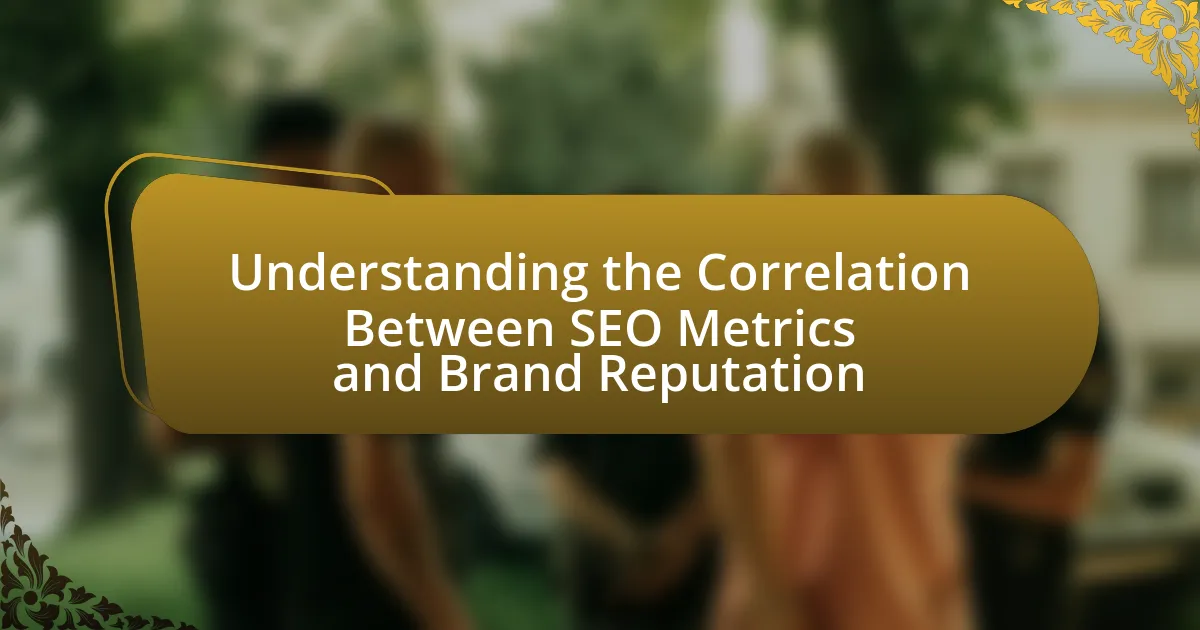The article explores the significant correlation between SEO metrics and brand reputation, highlighting how improved SEO performance enhances brand perception and consumer trust. Key metrics such as organic traffic, click-through rates, and domain authority are examined for their roles in influencing visibility and credibility. The discussion includes the implications of neglecting SEO in brand management, the importance of high-quality backlinks, and actionable strategies for businesses to align their SEO efforts with brand reputation goals. Overall, the article emphasizes that effective SEO strategies not only drive traffic but also play a crucial role in building and maintaining a positive brand image.

What is the correlation between SEO metrics and brand reputation?
The correlation between SEO metrics and brand reputation is significant, as higher SEO performance often leads to improved brand perception. When a brand ranks well in search engine results, it increases visibility and credibility, which positively influences consumer trust. For instance, a study by Moz found that 70% of users are more likely to trust brands that appear on the first page of search results. Additionally, metrics such as organic traffic, click-through rates, and backlinks reflect a brand’s authority and relevance, further enhancing its reputation. Therefore, effective SEO strategies not only drive traffic but also bolster brand reputation through increased trust and visibility.
How do SEO metrics influence brand perception?
SEO metrics significantly influence brand perception by affecting visibility, credibility, and user experience. High rankings in search engine results pages (SERPs) enhance a brand’s visibility, leading consumers to associate top positions with authority and trustworthiness. For instance, a study by HubSpot found that 75% of users never scroll past the first page of search results, indicating that brands appearing on the first page are perceived as more reputable. Additionally, metrics such as click-through rates (CTR) and bounce rates provide insights into user engagement; a high CTR suggests that users find the brand relevant, while a low bounce rate indicates satisfaction with the content. This positive user interaction further solidifies a favorable brand perception. Therefore, effective SEO strategies that improve these metrics can directly enhance how consumers view a brand.
What specific SEO metrics are most relevant to brand reputation?
The specific SEO metrics most relevant to brand reputation include organic search traffic, keyword rankings, click-through rates (CTR), and domain authority. Organic search traffic indicates the volume of visitors arriving at a website through search engines, reflecting the brand’s visibility and credibility. Keyword rankings show how well a brand’s content performs for targeted search terms, influencing perceived authority. Click-through rates measure the percentage of users who click on a brand’s link in search results, indicating the effectiveness of titles and meta descriptions in attracting interest. Domain authority, a score developed by Moz, assesses a website’s credibility based on its backlink profile and overall SEO strength, directly impacting brand trustworthiness. These metrics collectively provide insights into how a brand is perceived online, influencing its reputation.
How do changes in SEO metrics reflect on brand trust?
Changes in SEO metrics directly reflect on brand trust by influencing visibility, credibility, and user perception. For instance, higher organic search rankings typically indicate that a brand is viewed as more authoritative and relevant, which fosters trust among consumers. A study by Moz found that 61% of marketers believe improving SEO and organic presence is crucial for building brand trust. Additionally, metrics such as click-through rates and bounce rates provide insights into user engagement; a high click-through rate suggests that users find the brand appealing, while a low bounce rate indicates that visitors are satisfied with the content, further enhancing trust. Therefore, fluctuations in SEO metrics serve as indicators of how consumers perceive a brand’s reliability and authority in its industry.
Why is understanding this correlation important for businesses?
Understanding the correlation between SEO metrics and brand reputation is crucial for businesses because it directly influences their online visibility and consumer trust. High SEO rankings often correlate with positive brand perception, leading to increased traffic and sales. For instance, a study by Moz found that 70% of consumers prefer organic search results over paid ads, indicating that strong SEO can enhance brand credibility. Therefore, businesses that grasp this correlation can strategically optimize their online presence, ultimately fostering customer loyalty and driving revenue growth.
What are the potential risks of neglecting SEO in brand management?
Neglecting SEO in brand management can lead to decreased online visibility, resulting in lower website traffic and diminished brand awareness. When a brand fails to optimize its online presence, it risks being overshadowed by competitors who effectively utilize SEO strategies. According to a study by HubSpot, 75% of users never scroll past the first page of search results, indicating that brands not appearing on the first page are likely to miss out on significant customer engagement and potential sales. Additionally, poor SEO can harm a brand’s reputation, as users often associate high search rankings with credibility and trustworthiness. Thus, neglecting SEO not only affects visibility but also undermines the brand’s overall reputation in the digital landscape.
How can a strong SEO strategy enhance brand reputation?
A strong SEO strategy enhances brand reputation by improving online visibility and credibility. When a brand ranks higher in search engine results, it is perceived as more trustworthy and authoritative by consumers. Research indicates that 75% of users never scroll past the first page of search results, meaning that brands appearing at the top are more likely to be recognized and trusted. Additionally, effective SEO practices, such as optimizing content for relevant keywords and ensuring a positive user experience, contribute to higher engagement rates, which further solidifies a brand’s reputation.

What are the key SEO metrics that impact brand reputation?
Key SEO metrics that impact brand reputation include organic search traffic, keyword rankings, click-through rates (CTR), bounce rates, and domain authority. Organic search traffic reflects the number of visitors arriving from search engines, indicating brand visibility and relevance. Keyword rankings show how well a brand’s content performs for targeted search terms, influencing perceived authority. High CTR suggests that users find the brand appealing in search results, while low bounce rates indicate that visitors engage with the content, enhancing brand perception. Domain authority, a score reflecting a website’s credibility, affects trustworthiness and reputation in the eyes of both users and search engines. These metrics collectively shape how a brand is perceived online, directly influencing its reputation.
How does organic traffic relate to brand credibility?
Organic traffic significantly enhances brand credibility by demonstrating a brand’s authority and relevance in its industry. When a website consistently attracts organic traffic, it indicates that users find its content valuable and trustworthy, which in turn fosters a positive perception of the brand. According to a study by HubSpot, 75% of users never scroll past the first page of search results, meaning that brands appearing prominently in organic search results are often perceived as more credible and reliable. This visibility not only boosts user trust but also encourages further engagement and loyalty, reinforcing the brand’s reputation over time.
What role does click-through rate (CTR) play in brand perception?
Click-through rate (CTR) significantly influences brand perception by serving as an indicator of audience interest and engagement. A higher CTR suggests that users find the brand’s messaging relevant and appealing, which can enhance the brand’s reputation and credibility. For instance, a study by HubSpot found that a 10% increase in CTR can lead to a 20% increase in brand awareness, demonstrating the direct correlation between CTR and how consumers perceive a brand. Thus, brands with higher CTRs are often viewed more favorably, as they are perceived to resonate better with their target audience.
How can bounce rate affect a brand’s image?
A high bounce rate can negatively affect a brand’s image by signaling to users that the website may not meet their expectations or needs. When visitors leave a site quickly without engaging, it suggests poor user experience, which can lead to perceptions of low quality or relevance associated with the brand. Research indicates that websites with bounce rates above 70% often struggle with credibility, as users tend to associate high bounce rates with untrustworthy content or ineffective design. This perception can diminish brand loyalty and deter potential customers from returning, ultimately impacting the brand’s reputation in the market.
What is the significance of backlinks in shaping brand reputation?
Backlinks significantly influence brand reputation by serving as endorsements from other websites, which enhances credibility and authority. When reputable sites link to a brand, it signals to both search engines and users that the brand is trustworthy and valuable, thereby improving its online standing. Research indicates that 70% of marketers believe backlinks are crucial for SEO success, which directly correlates with brand perception. Additionally, a study by Moz found that higher domain authority, often achieved through quality backlinks, leads to increased consumer trust and brand loyalty.
How do high-quality backlinks contribute to brand authority?
High-quality backlinks significantly enhance brand authority by signaling trustworthiness and credibility to search engines and users. When reputable websites link to a brand’s content, it indicates that the content is valuable and relevant, which can improve the brand’s visibility in search engine results. According to a study by Moz, backlinks are one of the top three ranking factors for Google, demonstrating their critical role in SEO. Additionally, brands with numerous high-quality backlinks are often perceived as industry leaders, further solidifying their authority in the market.
What are the implications of toxic backlinks on brand reputation?
Toxic backlinks can severely damage brand reputation by associating the brand with low-quality or spammy websites. When search engines identify these harmful links, they can penalize the brand’s website, leading to decreased visibility in search results. This decline in visibility can result in reduced traffic, which negatively impacts customer perception and trust. A study by Moz indicates that 70% of consumers trust online reviews and search results, meaning that a drop in search rankings due to toxic backlinks can lead to a loss of credibility. Furthermore, brands linked to toxic sites may face public backlash, as consumers often associate the quality of a brand’s online presence with its overall reputation.

How can businesses leverage SEO metrics to enhance their brand reputation?
Businesses can leverage SEO metrics to enhance their brand reputation by analyzing data such as organic traffic, keyword rankings, and user engagement metrics. By focusing on organic traffic, businesses can gauge the effectiveness of their content and identify areas for improvement, which directly impacts how users perceive their brand. Monitoring keyword rankings allows businesses to understand their visibility in search results, ensuring they are associated with relevant and authoritative terms, thereby enhancing credibility. Additionally, user engagement metrics, such as bounce rates and time on site, provide insights into customer satisfaction and content quality, which are critical for building a positive brand image. For instance, a study by HubSpot found that companies with a strong SEO strategy experience 14.6% conversion rates, significantly higher than the 1.7% conversion rate of outbound methods, indicating that effective SEO not only drives traffic but also fosters trust and reputation.
What strategies can improve SEO metrics for better brand perception?
Implementing high-quality content creation, optimizing on-page SEO elements, and enhancing user experience are effective strategies to improve SEO metrics for better brand perception. High-quality content attracts backlinks and engages users, which boosts search rankings; for instance, websites with comprehensive content tend to rank higher on Google, as evidenced by a study from HubSpot showing that companies prioritizing blogging are 13 times more likely to achieve a positive ROI. Optimizing on-page elements, such as meta tags and headings, ensures search engines accurately index the content, leading to improved visibility. Additionally, enhancing user experience through fast loading times and mobile optimization reduces bounce rates, which positively influences SEO rankings, as Google considers user engagement metrics in its algorithms.
How can content quality influence both SEO and brand reputation?
Content quality significantly influences both SEO and brand reputation by enhancing user engagement and trust. High-quality content attracts more visitors, reduces bounce rates, and encourages longer site visits, which are critical factors for SEO rankings. For instance, Google’s algorithm prioritizes content that provides value and relevance, leading to improved visibility in search results. Additionally, quality content fosters a positive brand image; consumers are more likely to trust and engage with brands that consistently deliver valuable information. Research from HubSpot indicates that 70% of consumers prefer to learn about a company through articles rather than ads, underscoring the importance of content quality in shaping brand perception.
What role does social media play in enhancing SEO and brand image?
Social media significantly enhances SEO and brand image by driving traffic, increasing brand visibility, and fostering engagement. When businesses share content on social media platforms, they create backlinks to their websites, which search engines recognize as a signal of authority and relevance, thereby improving search rankings. According to a study by HubSpot, 75% of marketers reported that social media has positively impacted their SEO efforts. Additionally, a strong social media presence helps build brand credibility and trust, as consumers often rely on social proof from social channels before making purchasing decisions. This dual impact of social media on both SEO and brand image underscores its critical role in digital marketing strategies.
What are the best practices for monitoring the correlation between SEO and brand reputation?
The best practices for monitoring the correlation between SEO and brand reputation include utilizing analytics tools, tracking keyword rankings, and analyzing online sentiment. Analytics tools like Google Analytics provide insights into website traffic and user behavior, which can indicate how brand reputation influences SEO performance. Tracking keyword rankings helps identify how brand-related searches perform over time, revealing shifts in public perception. Analyzing online sentiment through social media monitoring and review platforms allows businesses to gauge public opinion and its impact on search visibility. Research shows that brands with positive online sentiment often experience higher organic search rankings, reinforcing the connection between SEO and brand reputation.
How can businesses effectively track changes in SEO metrics?
Businesses can effectively track changes in SEO metrics by utilizing analytics tools such as Google Analytics, SEMrush, or Ahrefs. These tools provide comprehensive data on keyword rankings, organic traffic, and user engagement, allowing businesses to monitor performance over time. For instance, Google Analytics offers insights into website traffic sources and user behavior, while SEMrush tracks keyword positions and backlinks. Regularly analyzing this data helps businesses identify trends, measure the impact of SEO strategies, and make informed adjustments to improve their online presence.
What tools are available for analyzing the impact of SEO on brand reputation?
Tools available for analyzing the impact of SEO on brand reputation include Google Analytics, SEMrush, Moz, Ahrefs, and Brand24. Google Analytics provides insights into website traffic and user behavior, which can indicate how SEO efforts affect brand perception. SEMrush and Ahrefs offer keyword tracking and backlink analysis, helping to assess how search visibility influences brand reputation. Moz provides tools for monitoring domain authority and search rankings, while Brand24 specializes in social listening, allowing brands to track mentions and sentiment across various platforms. These tools collectively enable businesses to evaluate the relationship between their SEO strategies and overall brand reputation effectively.
What actionable steps can businesses take to align SEO efforts with brand reputation goals?
Businesses can align SEO efforts with brand reputation goals by implementing a comprehensive strategy that includes optimizing for brand-related keywords, managing online reviews, and creating high-quality content that reflects brand values. Optimizing for brand-related keywords ensures that search results prominently feature the brand, enhancing visibility and credibility. Managing online reviews is crucial, as 93% of consumers read online reviews before making a purchase, and positive reviews can significantly boost brand reputation. Additionally, creating high-quality content that resonates with the target audience not only improves SEO rankings but also reinforces brand messaging, fostering trust and loyalty among consumers.

Leave a Reply